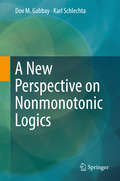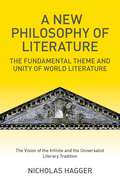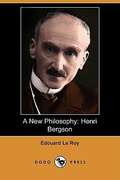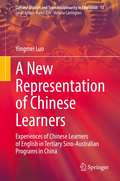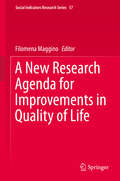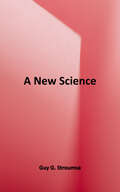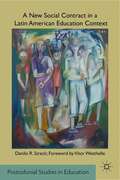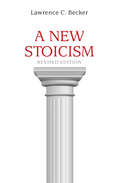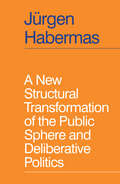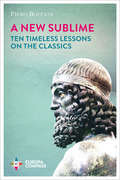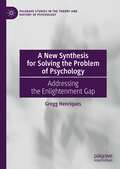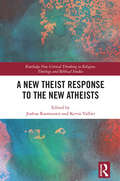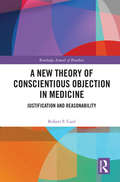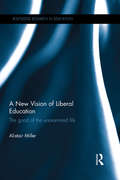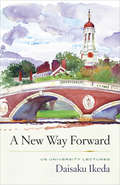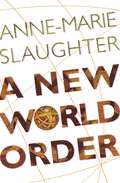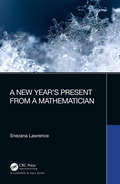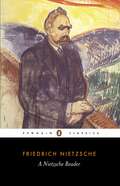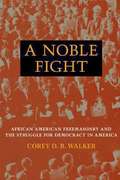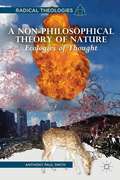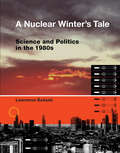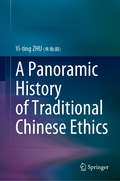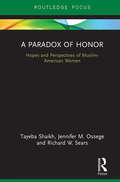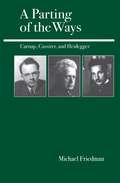- Table View
- List View
A New Perspective on Nonmonotonic Logics
by Dov M. Gabbay Karl SchlechtaIn this book the authors present new results on interpolation for nonmonotonic logics, abstract (function) independence, the Talmudic Kal Vachomer rule, and an equational solution of contrary-to-duty obligations. The chapter on formal construction is the conceptual core of the book, where the authors combine the ideas of several types of nonmonotonic logics and their analysis of 'natural' concepts into a formal logic, a special preferential construction that combines formal clarity with the intuitive advantages of Reiter defaults, defeasible inheritance, theory revision, and epistemic considerations. It is suitable for researchers in the area of computer science and mathematical logic.
A New Philosophy of Literature: The Fundamental Theme and Unity of World Literature: the Vision of the Infinite and the Universalist Literary Tradition
by Nicholas HaggerIn The New Philosophy of Universalism Nicholas Hagger outlined a new philosophy that restates the order within the universe, the oneness of humankind and an infinite Reality perceived as Light; and its applications in many disciplines, including literature. In this work of literary Universalism, which carries forward the thinking in T.S. Eliot&’s &‘Tradition and the Individual Talent&’ and other essays, Hagger traces the fundamental theme of world literature, which has alternating metaphysical and secular aspects: a quest for Reality and immortality; and condemnation of social vices in relation to an implied virtue. Since classical times these two antithetical traditions have periodically been synthesised by Universalists. Hagger sets out the world Universalist literary tradition: the writers who from ancient times have based their work on the fundamental Universalist theme. These can be found in the Graeco-Roman world, the Middle Ages and Renaissance, in the Baroque Age, in the Neoclassical, Romantic Victorian and Modernist periods, and in the modern time. He demonstrates that the Universalist sensibility is a synthesis of the metaphysical and secular traditions, and a combination of the Romantic inspired imagination (the inner faculty by which Romantic poets approached the Light) and the Neoclassical imitative approach to literature which emphasizes social order and proportion, a combination found in the Baroque time of the Metaphysical poets, and in Victorian and Modernist literature. Universalists express their cross-disciplinary sensibility in literary epic, as did Homer, Virgil, Dante and Milton, and in a number of genres within literature – and in history and philosophy. Universalist historians claim that every civilisation is nourished by a metaphysical vision that is expressed in its art, and when it declines secular, materialist writings lose contact with its central vision. As Universalist literary works restate the order within the universe, reveal metaphysical Being and restore the vision of Reality, Hagger excitingly argues that the Universalist sensibility renews Western civilisation&’s health. Literary Universalism is a movement that revives the metaphysical outlook and combines it with the secular, materialistic approach to literature that has predominated in recent times. It can carry out a revolution in thought and culture and offer a new direction in contemporary literature. This work conveys Universalism&’s impact on literature, and should be read by all who have concerns about the sickness and decline of contemporary European/Western culture.
A New Philosophy: Henri Bergson
by Edouard Le RoyProfessor douard Louis Emmanuel Julien Le Roy (1870- 1954) was a French philosopher and mathematician. Le Roy was received at the cole Normale Suprieure (ENS) in 1892 and at the Agrgation in mathematics in 1895. <P> <P> He became Doctor in Sciences in 1898, taught in several high schools, and became in 1909 professor of mathematics at the Lyce Saint-Louis in Paris. From then on, Le Roy took an important interest in philosophy and metaphysics. A friend of Teilhard de Chardin and Henri Bergson's closer disciple, he succeeded to him at the College of France (1922) and, in 1945, at the Acadmie Franaise. In 1919, Le Roy was also elected member of the Acadmie des Sciences Morales et Politiques. Le Roy especially interested himself to the relations between science and morality. Along with Henri Poincar and Pierre Duhem, he supported a conventionalist thesis on the foundation of mathematics. Although a fervent Catholic, he extended this conventionalist theory to revealed truths, which did not, according to him, withdraw any of their strength. His conventionalism led his works, charged of modernism, to be placed on the Index by the Holy See.
A New Representation of Chinese Learners: Experiences of Chinese Learners of English in Tertiary Sino-Australian Programs in China (Cultural Studies and Transdisciplinarity in Education #13)
by Yingmei LuoThis book examines Chinese tertiary students' experiences of learning English in Sino-Australian programs in China. Using an institutional ethnography, the book examines one well-established Sino-Australian program based at a Chinese university. The book explores the ways that participant students used the Chinese words, tropes and their meanings to describe their English learning experiences with both local Chinese and foreign English teachers. This book introduces an innovative theoretical framework, “representation theory with a multilingual perspective”, to analyse how Chinese students' everyday experiences are constructed and mediated through language, discourse and identity. This framework also highlights graphic examples of how concepts are created in both Chinese and English, and thus serves as a powerful tool for deconstructing dichotomies between China and the West. The aim of this book is, then, two-fold: to show how a novel theoretical lens can help us to develop more nuanced understandings of Chinese students, and to propose a new methodological and theoretical framework through which one can challenge the monolingual subjectivity and parochial views of both Chinese and Western conceptions.
A New Research Agenda for Improvements in Quality of Life (Social Indicators Research Series #57)
by Filomena MagginoThis book presents a new research agenda for improvements in Quality of Life research. It includes topics such as: -Studying QoL in particular subpopulations and selected subgroups -Disentangling the difficult task of identifying determinants of QoL -Perfectionating the measurement of conceptual dimensions -Defining new indicators able to measure and monitor particular social conditions and shows that these are not separated fields of studies but intersect each other and produce different outcomes which can be with difficulty classifiable, consistent with the idea of the complexity of our reality. The volume presents micro perspectives by taking into account the macro situation through both qualitative and quantitative approaches.
A New Science: The Discovery of Religion in the Age of Reason
by Guy G. StroumsaWe see the word “religion” everywhere, yet do we understand what it means, and is there a consistent worldwide understanding? Who discovered religion and in what context? <p><p>In A New Science, Guy Stroumsa offers an innovative and powerful argument that the comparative study of religion finds its origin in early modern Europe. The world in which this new category emerged was marked by three major historical and intellectual phenomena: the rise of European empires, that gave birth to ethnological curiosity; the Reformation, which permanently altered Christianity; and the invention of philology, a discipline that transformed Western intellectual thought. Against this complex historical backdrop, Stroumsa guides us through the lives and writings of the men who came to define the word “religion.” <p><p>As Stroumsa boldly argues, the modern study of religion, a new science, was made possible through a dialectical process between Catholic and Protestant scholars. Ancient Israelite religion, Judaism, Christianity, Islam, Manichaeanism, Zoroastrianism, the sacred beliefs of the New World, and those of Greece, Rome, India, and China, composed the complex ground upon which “religion,” a most modern category, was discovered.
A New Social Contract in a Latin American Education Context
by Danilo R. StreckA New Social Contract in a Latin American Education Context is committed to what has become known as "perspective of the South:" understanding the South not as a geographical reference but as a vindication of the existence of ways of knowing and of living which struggle for their survival and for a legitimate place in a world where the respect for difference is balanced with the right for equality. The metaphor of the new social contract stands for the desire to envision another world, which paradoxically cannot but spring out of the entrails of the existing one. Could the same contract under which the colonial orders were erected serve as a tool for decolonizing relations, knowledge, and power? Consequently, what kind of education could effectively help structure a new social contract? These are some of the questions Streck addresses.
A New Stoicism
by Lawrence C. BeckerWhat would stoic ethics be like today if stoicism had survived as a systematic approach to ethical theory, if it had coped successfully with the challenges of modern philosophy and experimental science? A New Stoicism proposes an answer to that question, offered from within the stoic tradition but without the metaphysical and psychological assumptions that modern philosophy and science have abandoned. Lawrence Becker argues that a secular version of the stoic ethical project, based on contemporary cosmology and developmental psychology, provides the basis for a sophisticated form of ethical naturalism, in which virtually all the hard doctrines of the ancient Stoics can be clearly restated and defended. Becker argues, in keeping with the ancients, that virtue is one thing, not many; that it, and not happiness, is the proper end of all activity; that it alone is good, all other things being merely rank-ordered relative to each other for the sake of the good; and that virtue is sufficient for happiness. Moreover, he rejects the popular caricature of the stoic as a grave figure, emotionally detached and capable mainly of endurance, resignation, and coping with pain. To the contrary, he holds that while stoic sages are able to endure the extremes of human suffering, they do not have to sacrifice joy to have that ability, and he seeks to turn our attention from the familiar, therapeutic part of stoic moral training to a reconsideration of its theoretical foundations.
A New Structural Transformation of the Public Sphere and Deliberative Politics
by Jürgen HabermasJürgen Habermas’s book The Structural Transformation of the Public Sphere, first published in 1962, has long been recognized as one of the most important works of twentieth-century social thought. Blending philosophy and social history, it offered an account of the public sphere as a domain that mediates between civil society and the state in which citizens could discuss matters of common concern and participate in democratic decision-making through the formation of public opinion. Now, in view of the digital revolution and the resulting crisis of democracy, he returns to this important topic. In this new book Habermas focuses on digital media, in particular social media, which are increasingly relegating traditional mass media to the background. While the new media initially promised to empower users, this promise is being undermined by their algorithm-steered platform structure that promotes self-enclosed informational ‘bubbles’ and discursive ‘echo chambers’ in which users split into a plurality of pseudo-publics that are largely closed off from one other. Habermas argues that, without appropriate regulation of digital media, this new structural transformation is in danger of hollowing out the institutions through which democracies can shape social and economic processes and address urgent collective problems, ranging from growing social inequality to the climate crisis.
A New Sublime: Ten Timeless Lessons on the Classics
by Piero BoitaniIn a book &“as bewitching and entertaining as a novel&” a renowned Italian literary critic &“uncovers the unexpected, extraordinary modernity of the classics&” (Piero Dorfles). In A New Sublime, literary critic Piero Boitani reveals the timeless beauty and wisdom of ancient literature, highlighting its profound and surprising connections to the present. Ranging from Homer to Tacitus, with Thucydides, Aristotle, Sophocles, Cicero, and many others in between, Boitani&’s fresh and inspiring insights remind us of the enduring importance and beauty of the classics of the Western canon. Boitani explores what the classics have to say about the mutability and fluidity of identity and matter, the power and position of women in society. He also looks closely at their depictions of force and subjugation, fate and free will, the ethical life, hospitality, love, compassion, and mysticism. Through it all, he shows how the classics can play active roles in our contemporary lives.
A New Synthesis for Solving the Problem of Psychology: Addressing the Enlightenment Gap (Palgrave Studies in the Theory and History of Psychology)
by Gregg HenriquesIn this incisive analysis of academic psychology, Gregg Henriques examines the fragmented nature of the discipline and explains why the field has had enormous difficulty specifying its subject matter and how this has limited its ability to advance our knowledge of the human condition. He traces the origins of the problem of psychology to a deep and profound gap in our knowledge systems that emerged in the context of the scientific Enlightenment.To address this problem, this book introduces a new vision for scientific psychology called mental behaviorism. The approach is anchored to a comprehensive metapsychological framework that integrates insights from physics and cosmic evolution, neuroscience, the cognitive and behavioral sciences, developmental and complex adaptive systems theory, attachment theory, phenomenology, and social constructionist perspectives and is well grounded in the philosophy of science. Building on more than twenty years of work in theoretical psychology and drawing on a wide range of literature, Professor Henriques shows how this new approach to scientific knowledge fills in the gaps of our current understanding of psychology and can allow us to develop a more holistic and sophisticated way to understand animal and human mental behavioral patterns. This work will especially appeal to students and scholars of general psychology and theoretical psychology, as well as to historians and philosophers of science.
A New Theist Response to the New Atheists (Routledge New Critical Thinking in Religion, Theology and Biblical Studies)
by Joshua Rasmussen Kevin VallierIn response to the intellectual movement of New Atheism, this volume articulates a "New Theist" response that has at its core a desire to engage in productive and depolarizing dialogue. To ensure this book is of interest to atheists and theists alike, a team of experts in the field of philosophy of religion offer an assessment of the strongest New Atheist arguments. The chapters address the most pertinent questions about God, including politics and morality, and each essay shows how a reflective theist might deal with points raised by the New Atheists. This volume is a serious academic engagement with the questions asked by New Atheism. As such, it will be of significant interest to scholars working in the philosophy of religion and theology, as well as those engaged in religious studies generally.
A New Theory of Conscientious Objection in Medicine: Justification and Reasonability (Routledge Annals of Bioethics)
by Robert F. CardThis book argues that a conscientiously objecting medical professional should receive an exemption only if the grounds of an objector’s refusal are reasonable. It defends a detailed, contextual account of public reasonability suited for healthcare, which builds from the overarching concept of Rawlsian public reason. The author analyzes the main competing positions and maintains that these other views fail precisely due to their systematic inattention to the grounding reasons behind a conscientious objection; he argues that any such view is plausible to the extent that it mimics the ‘reason-giving requirement’ for conscience objections defended in this work. Only reasonable objections can defeat the prior professional obligation to assign primacy to patient well-being, therefore one who refuses a patient’s request for a legally available, medically indicated, and safe service must be able to explain the grounds of their objection in terms understandable to other citizens within the public institutional structure of medicine. The book further offers a novel policy proposal to deploy the Reasonability View: establishing conscientious objector status in medicine. It concludes that the Reasonability View is a viable and attractive position in this debate. A New Theory of Conscientious Objection in Medicine: Justification and Reasonability will be of interest to researchers and advanced students working in bioethics, medical ethics, and philosophy of medicine, as well as thinkers interested in the intersections between law, medical humanities, and philosophy.
A New Vision of Liberal Education: The good of the unexamined life (Routledge Research in Education)
by Alistair Miller‘This is an extremely important book. Wonderfully well researched and written, it develops a powerful argument about how we should conceive of the aims of education and design curricula. It should define the field for a very considerable period of time.’ - Professor Michael J Reiss, Institute of Education, University of London, UK Many philosophers of education believe that the main aim of education is to endow students with personal autonomy, producing citizens who are reflective, make rational choices, and submit their values and beliefs to critical scrutiny. This book argues that the ‘good life’ need not be the life of the philosopher, politician or critical thinker, but that an ordinary ‘unexamined’ life is also worth living. Central to this ethical life is the engagement in worthwhile activities or ‘practices’, and the best way to prepare pupils for their engagement in these practices is to cultivate a range of moral and intellectual virtues. In this book, Alistair Miller brings together a range of philosophical and historical perspectives to argue for a new vision of liberal education: liberal in the sense that it forms a moral and cultural inheritance, new in the sense that it would enable all pupils to lead flourishing lives. Divided into two sections, the first part of the book seeks to establish the justified aims of education in a liberal democratic society; the second part explores the nature of the school curriculum that might realise these aims. A New Vision of Liberal Education will appeal to researchers, academics and postgraduate students in the fields of philosophy of education, moral and values education, liberal education, and curriculum studies.
A New Way Forward: US University Lectures
by Daisaku Ikeda"Wisdom and compassion are intimately linked and mutually reinforcing.Compassion in Buddhism does not involve the forcible suppression ofour natural emotions, our likes and dislikes. Rather, it is the realization thateven those whom we dislike have qualities that can contribute to our livesand can afford us opportunities to grow in our own humanity."—Daisaku IkedaPeace lies along the path of humanity's growth and inner transformation. With this as a major theme, Daisaku Ikeda offers fresh insights and new ways of thinking in each of his seven US university lectures collected in A New Way Forward.These explorations on the power of dialogue, the interdependence of all life, the importance of developing in one's character the attributes of wisdom, courage, and compassion, and other topics, stir the heart and mind and lead to the inevitable conclusion that each individual holds the key to a lasting peace.
A New World Order
by Anne-Marie SlaughterGlobal governance is here--but not where most people think. This book presents the far-reaching argument that not only should we have a new world order but that we already do. Anne-Marie Slaughter asks us to completely rethink how we view the political world. It's not a collection of nation states that communicate through presidents, prime ministers, foreign ministers, and the United Nations. Nor is it a clique of NGOs. It is governance through a complex global web of "government networks." Slaughter provides the most compelling and authoritative description to date of a world in which government officials--police investigators, financial regulators, even judges and legislators--exchange information and coordinate activity across national borders to tackle crime, terrorism, and the routine daily grind of international interactions. National and international judges and regulators can also work closely together to enforce international agreements more effectively than ever before. These networks, which can range from a group of constitutional judges exchanging opinions across borders to more established organizations such as the G8 or the International Association of Insurance Supervisors, make things happen--and they frequently make good things happen. But they are underappreciated and, worse, underused to address the challenges facing the world today. The modern political world, then, consists of states whose component parts are fast becoming as important as their central leadership. Slaughter not only describes these networks but also sets forth a blueprint for how they can better the world. Despite questions of democratic accountability, this new world order is not one in which some "world government" enforces global dictates. The governments we already have at home are our best hope for tackling the problems we face abroad, in a networked world order.
A New Year’s Present From a Mathematician
by Snezana LawrenceA New Year’s Present from a Mathematician is an exciting book dedicated to two questions: What is it that mathematicians do? And who gets to be called a ‘mathematician’ and why? This book seeks to answer these questions through a series of stories ranging from the beginning of modern mathematics through to the 20th century, but not in a usual, chronological manner. The author weaves her story around major questions concerning nature of mathematics, and links mathematicians by the substance of their ideas and the historical and personal context in which they were developed. Ideal as a gift for anyone with an interest in mathematics, this book gives a powerful insight into mathematical concepts in an easy-to-read-and-digest manner, without trivializing their nature. The attention given to engaging examples, framed within a poetic narrative structure, means that this book can be enjoyed by almost anyone, regardless of their level of mathematical education.
A Nietzsche Reader
by Friedrich Nietzsche R. J. HollingdaleThe literary career of Friedrich Nietzsche (1844-1900) spanned less than twenty years, but no area of intellectual inquiry was left untouched by his iconoclastic genius. The philosopher who announced the death of God in The Gay Science (1882) and went on to challenge the Christian code of morality in Beyond Good and Evil (1886), grappled with the fundamental issues of the human condition in his own intense autobiography, Ecce Homo (1888). Most notorious of all, perhaps, his idea of the triumphantly transgressive übermann ('superman') is developed in the extreme, yet poetic words of Thus Spake Zarathustra (1883-92). Whether addressing conventional Western philosophy or breaking new ground, Nietzsche vastly extended the boundaries of nineteenth-century thought.
A Nietzsche Reader
by Friedrich NietzscheThe literary career of Friedrich Nietzsche (1844-1900) spanned less than twenty years, but no area of intellectual inquiry was left untouched by his iconoclastic genius. The philosopher who announced the death of God in The Gay Science (1882) and went on to challenge the Christian code of morality in Beyond Good and Evil (1886), grappled with the fundamental issues of the human condition in his own intense autobiography, Ecce Homo (1888). Most notorious of all, perhaps, his idea of the triumphantly transgressive übermann ('superman') is developed in the extreme, yet poetic words of Thus Spake Zarathustra (1883-92). Whether addressing conventional Western philosophy or breaking new ground, Nietzsche vastly extended the boundaries of nineteenth-century thought.
A Noble Fight: African American Freemasonry and the Struggle for Democracy in America
by Corey D. WalkerA Noble Fight examines the metaphors and meanings behind the African American appropriation of the culture, ritual, and institution of freemasonry in navigating the contested domain of American democracy. Combining cultural and political theory with extensive archival research--including the discovery of a rare collection of nineteenth-century records of an African American Freemason Lodge--Corey D. B. Walker provides an innovative perspective on American politics and society during the long transition from slavery to freedom. With great care and detail, Walker argues that African American freemasonry provides a critical theoretical lens for understanding the distinctive ways African Americans have constructed a radically democratic political imaginary through racial solidarity and political nationalism, forcing us to reconsider much more circumspectly the complex relationship between voluntary associations and democratic politics.
A Non-Philosophical Theory of Nature
by Anthony Paul SmithIn A Non-Philosophical Theory of Nature, Anthony Paul Smith asserts that the old theological and philosophical ideas about the unnatural are no longer tenable. Parts of nature seem to be at war with one another - the human against the rest of the biosphere - and this is because our very understanding of the idea of nature that comes to us from philosophy and theology has perpetuated that war. Smith argues that the very idea of nature must be rethought as ecological. Towards that purpose heuses the methodology of Fran#65533;ois Laruelle's non-philosophy to bring together the fields of philosophy, theology, and scientific ecology and treat them as ecological material. Out of this ecology of thought, a new theory of nature emerges for an ecological age.
A Nuclear Winter's Tale: Science and Politics in the 1980s (Transformations: Studies in the History of Science and Technology)
by Lawrence BadashThe rise and fall of the concept of nuclear winter, played out in research activity, public relations, and Reagan-era politics.The nuclear winter phenomenon burst upon the public's consciousness in 1983. Added to the horror of a nuclear war's immediate effects was the fear that the smoke from fires ignited by the explosions would block the sun, creating an extended “winter” that might kill more people worldwide than the initial nuclear strikes. In A Nuclear Winter's Tale, Lawrence Badash maps the rise and fall of the science of nuclear winter, examining research activity, the popularization of the concept, and the Reagan-era politics that combined to influence policy and public opinion. Badash traces the several sciences (including studies of volcanic eruptions, ozone depletion, and dinosaur extinction) that merged to allow computer modeling of nuclear winter and its development as a scientific specialty. He places this in the political context of the Reagan years, discussing congressional interest, media attention, the administration's plans for a research program, and the Defense Department's claims that the arms buildup underway would prevent nuclear war, and thus nuclear winter.A Nuclear Winter's Tale tells an important story but also provides a useful illustration of the complex relationship between science and society. It examines the behavior of scientists in the public arena and in the scientific community, and raises questions about the problems faced by scientific Cassandras, the implications when scientists go public with worst-case scenarios, and the timing of government reaction to startling scientific findings.
A Panoramic History of Traditional Chinese Ethics
by Yi-ting ZHU (朱贻庭)This book traces the trajectory of traditional Chinese ethics from West Zhou Dynasty (1046-771 BC) through Qing Dynasty (1616—1912) and covers a myriad of Chinese philosophers who have expressed their ideas about the relationships between Heavenly Dao vs. Earthly Dao, Good vs. Evil, Morality vs. Legality, Knowledge vs. Behavior, Motive vs. Result, Righteousness vs. Profitability, Rationality vs. Animality. In this book, the readers can find Confucius’s discussion on Rite and Benevolence, Lao Zi’s meditation on Inaction of Great Dao, Zhuang Zi’s elaboration on “Transcendental Freedom”, Mohist utilitarian “Universal Love”, and Mencian theory of “Primordial Good Humanity”, to name just a few phenomenal figures. A compact yet elaborate, panoramic yet profound guidebook to traditional Chinese ethical thought, this book is an excellent window to showcase traditional Chinese mental and spiritual legacy. Composed, translated, and proofread by brilliant scholars, it produces a fluent and coherent English discourse of Chinese morality and ethics, nimbly spinning together the threads of Confucianism, Taoism, Buddhism, and other ideological schools with brief references to the historical situation. Consequently, it provides English readers, especially those curious about Chinese psychology and rationality, with thought-provoking and horizon-expanding perspectives, and provides Chinese readers, especially those of philosophy and translation, with a great number of typical and characteristic quotes of archaic Chinese that have never been translated before. Ultimately, it is a fundamental threshold to learning about Chinese people, Chinese culture, Chinese morality, Chinese mentality, Chinese policy, and Chinese diplomacy.
A Paradox of Honor: Hopes and Perspectives of Muslim-American Women (Researching Social Psychology)
by Richard W. Sears Tayeba Shaikh Jennifer M. OssegeBased on original interviews of 22 Muslim-American women of South Asian descent on the topics of honor and honor killings, this book examines honor and culture, and their intersections with power, tradition, gender, family, and religion. Additionally, it incorporates an autoethnographic approach describing the author’s journey to Pakistan to create a personal narrative throughout. This volume offers a unique perspective that allows for informed exploration and description of Muslim-American women’s attitudes and beliefs surrounding the practice of killing women and girls in order to regain family honor.
A Parting of the Ways
by Michael FriedmanSince the 1930s, philosophy has been divided into two camps: the analytic tradition which prevails in the Anglophone world and the continental tradition which holds sway over the European continent.A Parting of the Ways looks at the origins of this split through the lens of one defining episode: the disputation in Davos, Switzerland, in 1929, between the two most eminent German philosophers, Ernst Cassirer and Martin Heidegger. This watershed debate was attended by Rudlf Carnap, a representative of the Vienna Circle of logical positivists.Michael Friedman shows how philosophical differences interacted with political events. Both Carnap and Heidegger viewd their philosophical efforts as tied to their radical social outlooks, with Carnap on the left and Heidegger on the right, while Cassirer was in the conciliatory classical tradition of liveral republicanism. The rise of Hitler led to the emigration from Europe of most leading philosophers, including Carnap and Cassirer, leaving Heidegger alone on the continent.
